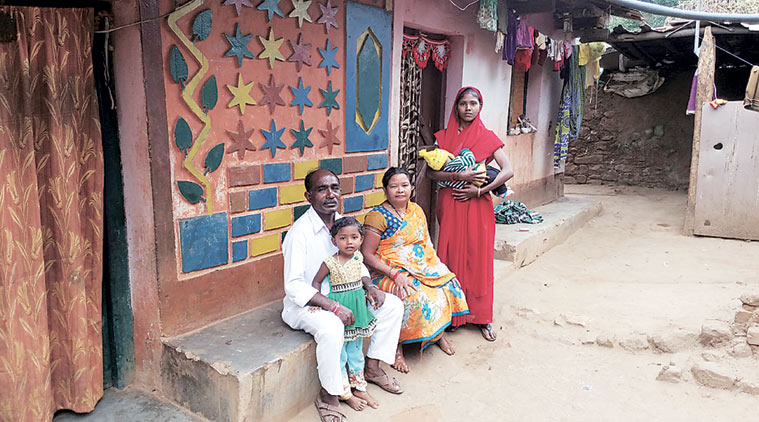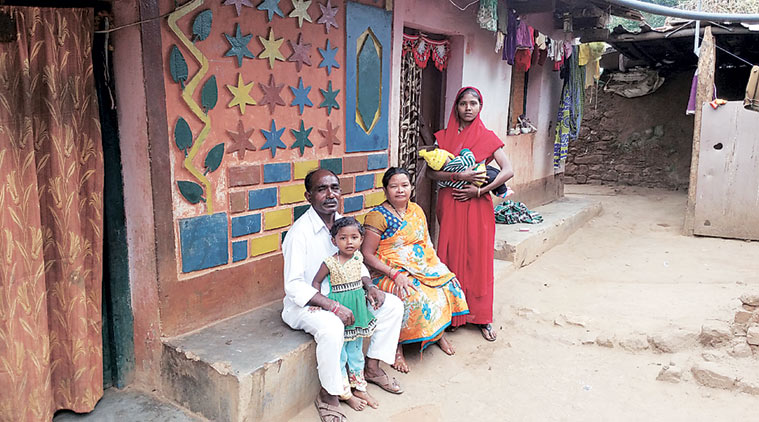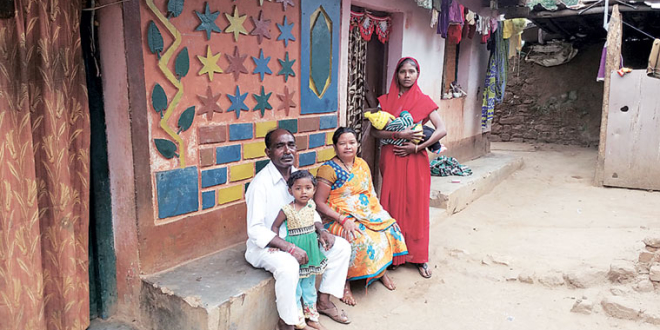
 Santosh Yadav’s family in Darbha, Bastar. (Source: Express Photo)
Santosh Yadav’s family in Darbha, Bastar. (Source: Express Photo)
Many weeks have passed since Santosh Yadav, a correspondent for several newspapers in Chhattisgarh, was arrested in Bastar. Police allege he was an ally of the Maoists. The arrest was made under the Chhattisgarh Special Public Security Act, 2005 (CSPSA), which allows the police to detain a person without producing a chargesheet for as long as 90 days. The state government and the police are yet to provide details of the arrest.
Yadav is the second journalist to be arrested on charges of supporting the Maoists since Chhattisgarh became a separate state 15 years ago. The first case was several years ago. Sai Reddy, a journalist who worked for many newspapers, was released after a court found the allegations baseless. Ironically, he was one of two journalists to be killed by the Maoists in Bastar. Reddy’s story points to the dangers journalists face in a conflict zone like Bastar. They become targets of both the warring parties in the conflict. A small relief to journalists is that there have been only two arrests so far. The Maoists, however, have killed two people, accusing them of being police informers. No evidence was produced.
The Bastar region is larger than Kerala in size. State police record reveals that more than 1,100 security personnel, 642 Maoists and 1,455 civilians have died in incidents related to Maoist violence. Ten years ago, the Chhattisgarh Assembly unanimously passed the CSPSA. Chief Minister Raman Singh then assured the assembly that the act would not be used against media persons. Since the act doesn’t explicitly mention such an exemption for journalists, it has been open to misuse. Journalists in the capital city of Raipur, the hub of print and electronic media in the state, don’t feel threatened by the CSPSA, but Bastar is far away from Raipur. The media here is vulnerable to state power.
Media workers in Bastar, like in the rest of Chhattisgarh, are forced to multitask. They represent several organisations, both print and electronic. A majority even need to generate advertisements. In smaller centres, they may have to distribute copies, personally or through hawkers. Some also act as business representatives for their employers, which makes them vulnerable to pressure and influence from officials and politicians, who are major advertisers. They are therefore vulnerable to governmental pressure.
Chhattisgarh’s conflict zone poses another professional hazard. Journalists are vulnerable to allegations by both the police and the Maoists, who claim they are informers for the other side. In Bastar, journalists’ telephonic conversations are under special risk of being tapped and recorded. The police has extensive phone-tapping authority, and capacity, under the internal security maintenance law. The Maoists, of course, do not need telephonic proof to act.
Several journalists in Bastar say they can not afford to criticise the police if it affects security operations. However, there are many others who write hard-hitting stories on police brutality. They are neither arrested nor removed by their organisations under government or corporate pressure. However, reporters are suspected to be allies of the Maoists if they are the first to reach the scene of violence or an encounter. And, the Maoists view reporters as police informers if any police action comes following a reporter’s interaction with them. While journalists from outside Chhattisgarh visit Bastar and report on atrocities and human rights violations by security forces, few write on the atrocities committed by the Maoists. In areas under the Maoist influence, it is extremely difficult for a reporter to verify information. In their areas of influence or dominance, both the Maoists and the security forces may force vulnerable persons at gunpoint to say what they want to be said.
Santosh Yadav, who worked for my newspaper sometime ago, faces serious charges. Many journalists in Bastar feel he was not a journalist. I believe most media workers in Bastar are journalists only till they are arrested. Their own organisations and fellow journalists disown them after, as if they were spies in an enemy country.
![]()
Source: New feed






